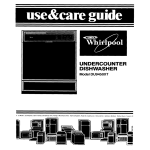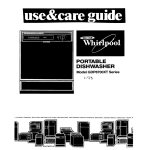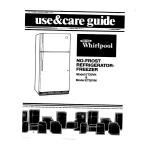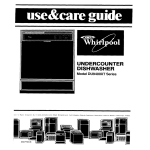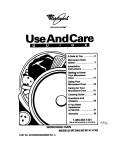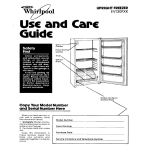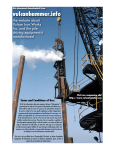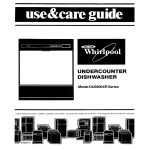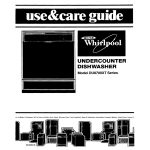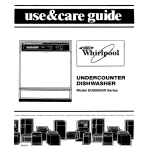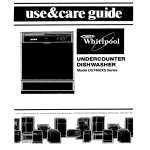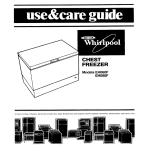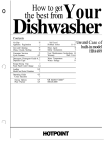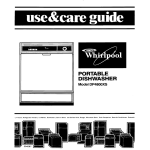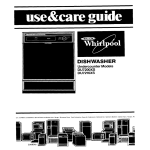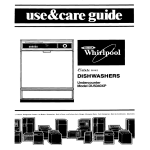Download Whirlpool DU9100XT Series User's Manual
Transcript
UNDERCOUNTER DISHWASHER Model DU91OOXTSeries Contents %ge BEFORE YOU USE YOUR DISHWASHER IMPORTANT SAFETY INSTRUCTIONS PARTS AND FEATURES.. QUICK STARTING STEPS POWER CLEAN* WASHING SYSTEM Quiet Operating Tips PROPER LOADING Top Rack Loading Bottom Rack Loading Silverware Basket Loading Page 2 2 3 4 4 4 5 5 6 6 ADDING DETERGENT RINSE AID DISPENSER. :: : STARTING YOUR DISHWASHER. : Selecting a Cycle Selecting an Option : ENERGY SAVING TIPS SPECIAL TIPS : COMMON DISHWASHING PROBLEMS,, IF YOU NEED SERVICE OR ASSISTANCE. WHIRLPOOL DISHWASHER WARRANTY 7 7 8 8 9 10 11 12 14 16 ‘Tmk ~1988 Whirlpool Corporation Before you use your dishwasher It is Your personal responsibility and obligation to be sure your dishwasher: Is installed by a qualified installer. l Has been installed where it is protected from the elements. l Has been installed on a floor strong enough to support its weight. l Has been properly connected to electricity, water and drain.’ l Has been properly electrically grounded.* l Has had all hang tags and temporary labels removed. l Is not used by children or anyone unable to operate it properly. l Is properly maintained. *See installation instructions for comolete information. l Parts and features Model DU9100XT Series RACK BUMPER BOTTOM RACK DETERGENT DIS SILVERWARE BASKET RINSE AID THE OVERFLOW ACCESS COLOR PANEL I DOOR COLOR PANEL THE POWER CLEAN’ MODULE is designed to keep the wash and rinse water clean. It removes food particles from the water, stores them, then washes them down the drain. It also grinds up larger food particles. During grinding, some sounds will be heard. ‘Tmk. buying l’hank you ror a Whirlpool appliance. Please complete and mail the Owner Registratlon Card provided with this product. Then complete the form below. Have this information yo 7~ I’ yc need sewIce or call with a question t ‘. .:?:I i VI,. ie .IW jerlal NumDers from plate ws a;ac -3~ abcvej and purchase date from ,3les slid ,Cl::k CIWYsales slip together in a * tiecp :hls Y)rKi\ p, .cF’ Model Number Serial Number Purchase Date Service Company Phone Number Quick Starting Steps 1. Properly load the top and bottom racks, and silverware baskets. 2. Spin the Upper and Lower Spray Arms to make sure nothing will stop them from turning freely. 3. Add detergent. 4. Check rinse aid dispenser. 5. Close and latch door. 6. Run hot water at sink nearest dishwasher it is hot. Turn it off. 7. Select a cycle. 8. Select an option. 9. Press START. until POWER CLEAN* Washing System Your dishwasher cleans by spraying a mixture of hot, clean water and detergent against soiled surfaces of dishes. When a cycle is started, the dishwasher fills with water to about the level of the heating element. This water is pumped through the rotating spray arms, through the POWER CLEAN* Module which removes food particles, and back through the rotating spray arms. Soiled water is pumped out and replaced with clean water during a cycle - the number of times depends on the cycle being used. Load dishes so soiled surfaces spray from rotating arms. Step-saving preparation face powerful for washing It is not necessary to rinse dishes betore putting them Into the dishwasher. Just remove large pieces, bones, and other hard items. The POWER CLEAN* Module will remove food panicles from the water. It contains a chopping device which w/II reduce the size of food items. If hard items such as fruit seeds, nuts and egg shells enter the POWER CLEAN* Module, YOU ‘I Check Water Temperature might hear chopping, grinding, crunching or buzzing sounds. Those sounds are normal when hard items enter the module. DO NOT LET METALLIC ITEMS (I.E. POT HANDLE SCREWS) GET INTO THE POWER CLEAN* MODULE. THIS COULD RESULT IN DAMAGE TO THE POWER CLEAN’ MODULE. Water must be hot For best cleaning and drying results, water should be at least 140°F (60°C). 1. Turn on hot water faucet nearest the dishwasher. Let water run until it is as hot as possible. 2. Hold a candy or meat thermometer in the stream of hot water to measure the temperature. 3. If the temperature is too low, have a qualified person raise the water heater thermostat setting Quiet operating tips To avoid thumping and clattering noises during operation: l Makesurelightweight load itemsaresecured in the rack l Make sure pot lids and handles, pizza pans, cookie sheets, etc. do not touch intenor walls 4 or interfere with either of the spray arms rotation. l Load dishes so they don’t touch one another. NOTE: Keep slnk dmln plugs inserted durtng dlshwasher operation to prevent noise tmnsfer through dmlns. ‘Tmk Proper loading Always load dishes so soiled surfaces are reached by spray from rotating Water must be able to drain off completely for best drying results. Be careful items so sprav can reach all surfaces. spray arms. to separate Top rack loading I CUP AND GLASS LOAD The Top razk is designed for cups, glasses and smaller items. l Place so open ends face down for cleaning and draining l load glasses in top rack only. Bottom rack is not designed for glasses. Damage mav occur l l l Place items in the rows between prongs. Placing them over the prongs can lead to breakage. Be sure lightweight items are held firmly in place. China, crystal and other delicate items must not touch each other during dishwasher operation. Damage may occur. UTENSIL LOAD a Load plastic items in the top rack only. Only plastic items marked “dishwasher safe” are recommended. e Plastic items can be melted in the bottom rack. o Items with cooked-on solled surfaces facing or dried-on the spray. foods l Small bowls, pans and other utensils can be placed in the top rack. should be loaded in the bottom rack with 5 Bottom rack loading Sii\erware basket loading NO Make sure pot handles and other items do not stop rotation of either the upper or lower spray arm. Spray arms must move freely. Load items so they do not block or cover the spray tower. Securely place heavily soiled cookware face down in rack. l l l YES MIX Items In each section of rhe basket Small items -baby bottle caps. jar lids. etc.-can be put In any seCttOn Moke sure sharp Items (knives. forks, skewers. etc j are put IP point down The silverware basket can be loaded while it’s In place on the door, or it can be taken out for loading on the counter or table It can also be removed for easy unloadrng. Always unload or remove the basket before unloading the racks to avoid spilling water droplets on the l Place plates, soup bowls, etc., between prongs and facing the spray. To remove the basket, slide It toward the top of the door - by the handle. Lift it off the holding buttons. Replace it in reverse order. l Load cookie sheets, cake pans and other large items at sides or back. Loading such items in front may keep water spray from reaching detergent dispenser and silverware basket. NOTE: Do not load glasses, cups or plastic items in the bottom rack. l When lower rack is removed, replace with bumpers in front. 6 l To open the basket, as shown. Be sure the cover is completely latched before pulling out the bottom rack and before closing the dishwasher door. unhook the latch Adding detergent The krnd and amount of dishwasher detergent you use is an important getting your dishes clean. Read this section carefully. Use automatic washer detergent The detergent dishonly. dispenser The detergent dispenser has one section with a cover and one without. l Put detergent in both sections for cycles with two washes. l Put detergent in the covered section Only for cycles with one wash. l Push the cover down until it is latched. The cover opens automatically when the main wash starts. Detergent in the open section falls into the dishwasher when the door is closed. Other detergents are too mild and much too sudsy to work in the dishwasher. Different brands of dishwasher detergent have different amounts of phosphorus. Phosphorus softens water and helps prevent water spots on dishes. If water is hard and phosphorus content is low (6.0% or less), you may need to use more detergent or use a brand with a higher phosphorus content (8.7% or higher). COVE! C?VER Do not add detergent until you are ready to wash. Fresh automatic dishwasher detergent is necessary for best washing results. Store detergent tightly closed in a cool dry place. How much detergent part of Use covered section NORMAL Cycle for.. LATCH 1’ Use both sections for.. . POTS & PANS Cycle HEAVY Cycle to use The amount of detergent to use depends on the hardness of your water. If too little is used, dishes won’t be clean. However, if too much is used in soft water, glassware will begin to etch. Find out your waters hardness by asking your local water department, water softener company or county extension agent. l l l HARD -Fill 1 or both sections to top line if water is 8 or more grains of MEDIUM - Fill 1 or both sections to middle line if water is 5 to 7 grains of SOFT - Fill 1 or both sections to bottom line if water is 0 to 4 grains hardness. of Rinse aid dispenser A rinse aid helps keep water from forming droplets and drying as spots. Keep the dispenser filled with a rinse aid such as Jet-Dry.” A small amount is released automatically during the final rinse of each cycle. Check the dispenser periodically to see if it needs refilling. Keep the dispenser fill cap tightly closed. CONTROL PADS Starting your dishwasher Four control pads and the signal lights allow you to set and check the dishwasher’s function. When first installed, the signal lights will flash rapidly in order. The signal lights will also flash following a powerfailure. Press the CANCEL pad twice to clear the signal lights.To start the dishwasher, press the START pad once to display the cycle. The dishwasher is preset for the NORMAL cycle with the HEAT DRY option. If you want this cycle, press START again. To select a different cycle and/or option, just press the CYCLE pad and/or OPTIONS pad until the cycle and/or option you want is indicated by the signal lights. Each press of the pad advances the signal light to the next cycle or option. Press START to begin the cycle you selected. After each use, the dishwasher remembers the cycle and options used. The next time the display is lit up for selection, it will show the last cycle that was run. When dishes are loaded and ready to be washed... 1. Read “Important Safety Instructions’on page 2 before starting your dishwasher. 2. Spin the Upper and Lower Spray Arms to make sure nothing will stop them from turning freely. 3. Push door firmly when closing and it will automatically latch. 4. Run hot water at sink nearest dishwasher until it is hot. Turn it off. 5. Press the START pad. Skip to step 7 if you want to run the cycle indicated by thesignal lights. 6. You may select a different cycle by pressing the CYCLE pad. You may select a different option by pressing the OPTION pad. 7. Press the START pad again. Selecting a cycle POTS & PANS Maximum cleaning for cooked-on or baked-on foods. The cycle time delays while the dishwasher automatically heats the water to 145°F (63°C) in both washes and in the last rinse (marked *I. Cycle time** is 72 minutes plus the time needed to heat the water. 8 WASHING AND HEATING WATER ,---- RINSING AND HEATING WATER p-~-5 DRYING CLEAN HEAVY WASHING RINSING DRYING CLEAN A double wash for heavily soiled loads. Cycle time** is about 72 minutes. WASHING NORMAL RINSING DRYING CLEAN For normal, everyday soiled loads. (The Energy Guide Label is based on this cycle.) Cycle time*’ is about 65 minutes, RINSING RINSE 81 HOLD For rinsing a few items to be washed one or more days later. Cycle time is about 12 minutes. **Cycle time includes heated dry times Selecting an option Options can be selected by pressing the OPTIONS Pad. Each press of the Pad advances the selection to the next option: AIR DRY and then HEAT DRY. For example, if the HEAT DRY signal light is on and you want to select AIR DRY, press the OPTIONS pad once. AIR DRY Options can be changed options are not available. any time during HEAT DRY a cycle. AIR DRY The AIR DRY signal light will be ON when AIR DRY is selected The AIR DRY Option helps save energy, but the dishes take lonaer to drv [overnight) and some waterspottingmay result. Some items (such as plastics) may need towel drying. For best results, use a liquid rinse aid such as Jet-Dry’ in the rinse aid dispenser. If the RINSE & HOLD cycle is selected, HEAT DRY portion The AIR DRY signal light will be OFF when HEAT DRY is selected. Heat Dry means the air in the dishwasher is heated durina the “drv” of any cycle - except RINS<& HOLD. continued on next page 9 CLEAN signal The CANCEL pad allows you to cancel a cycle, to clear the signal lights or to make a new selection. If the dishwasher is washing, it will go into a 2 minute drain automarlcally DefOre shutting off. Pressing CANCEL again stops the drain. If the dishwasher had not been started or is not washing, it will clear the display. Pressing CANCEL again will start a 2 minute drain, if needed. light The CLEAN signal comes on at the end cycle to show that the is clean. It will stay on CANCEL or any other light of a load until con- trol pad is pressed. Energy saving tips You can help save energy it you: 1. Wash full loads. Running a half-filled dishwasher uses the some amount of electricity and hot water as a fully loaded machine. 2. Air dry dishes drying cycle. (overnight]. 3. load correctly for best washing results. Incorrect loading may cause poor washing and the need to rewash all or port of the load. 4. Don’t pre-rinse normally soiled dishes. Select the correct cycle for the load and use the recommended amount of detergent for good washing results without hand rinsing. 6. Use your dishwasher during off-peak hours. Local utilities recommend this to avoid heavy usage of energy at certain times of day 6. 10 when you don’t need a rapid Allow longer drying times Kitchen cleanup can be done quickly and efficiently through the use of your dishwasher. Most appliance parts that can fit in the dishwasher can be cleaned by it. Burned-on soil, however, should be cleaned by hand. Special tips on dishwasher use Remember, use your dishwasher only for the job it was designed to do. Some items are not dishwasher safe or may require special care. Read these special tips for the following items: hUUiUUIU: Aluminum loses its bright, shiny appearance and darkens in color due to minerals the water and the alkalinity of the dishwasher detergent. Colored aluminum may fade. in TIPS: If washed in the dishwasher avoid placing directly in front of detergent dispenser where it could be sprinkled with undissolved detergent, causing spotting, pitting, and discoloration. Follow utensil manufacturers’ cleaning instructions. China: Hand-painted, metal-trimmed, and antique china fade due to high water temperatures and alkaline detergent solution in the dishwasher. NOTE: Delicate, antique items should not be washed in the dishwasher. TIPS: Load china carefully. Do not allow piecesto touch each other. Test one piece by washing it daily in the dishwasher for several weeks. Then compare it with the rest of the set to see if colors have changed. CrjStal temperature. dishwasher. and decorative &SSeS: Crystal can break from sudden exposure to high water Metal trim and colorful decoration on glass will fade in time when washed in the NOTE: Delicate, antique items should not be washed in the dishwasher. TIPS: Load crystal carefully in top rack only. Be sure to load a few larger items in the bottom rack to reduce amount of force of water spray reaching glassware from lower spray arm. Use the shortest cycle. Flatware: Salty and acidic foods may tarnish silver and stainless flatware if allowed to remain on the utensils. A film may form on sterling silver and silver plate items washed in a dishwasher, This film is caused by reaction of silver with chlorine in the detergent. Gold flatware is not dishwasher safe. TIPS: Rinse flatware as soon as possible, especially if it is not to be washed right away. Dishwasher detergent may remove antique finishes. Wash by hand. Tarnish and film build-up can be removed with silver polish. Cast irOll UteUSik The seasoned TIPS: Wash by hand. To re-season, PhStiCS: Many plastics will have sensitive and may melt or warp. TIPS: If in doubt, protection try one piece. Non-stick finish UteUSilS: TIPS: Follow manufacturers’ Wood: Many wooden coat with unsalted “Dishwasher Place Pewter or pewter-like in the dishwasher. Safe” written in upper Rusting will result fat and heat in a slow oven foran hourortwo. on them. Some plastics rack only. AIR DRY option Most can be washed provides are heat additional in the dishwasher. suggestions. items will crack TIPS: Do not wash cutting dishwasher. TIPS: To keep pewter finish will be removed boards, and warp wooden materials: or lose their finish. salad bowls or knives with wooden May streak, discolor, and pit at its very best, hand wash with mild detergent. Dishwasher care & cleaning: Exterior - Regular use of a soft damp cloth or sponge and a mild detergent is all that is necessary, in most cases, to keep the outside of your dishwasher nice looking and clean. Interior - Hard water minerals may cause a white film to build-up on the inside surfaces, especially just beneath the door area. Wear rubber gloves when cleaning the dishwasher interior. Do not use any type of cleanser other than dishwasher detergent because it may cause foaming or sudsing. handles in the Common dishwashing problems PROBLEM CAUSED BY SOLUTION Spotting and fllmlng (hard water film] Hard water Fill detergent tergent with be necessary To remove dispensers to capacity. Use dishwasher highest available phosphorus content. to install water softener spots and film, try a vinegar deMay rinse... 1. Wash and rinse load as usual. Use AIR DRY. 2. Remove all metal items, 3. Put 2 cups (500 mL) white vinegar in a container on the bottom rack. 4. Run dishwasherthrough a complete washing cycle. Water is not hot enough Not enough detergent, or Improper detergent “Old” detergent Improper loading No rinse aid AIR DRY Setting Small particles deposlted on items Dither not dry used Chlpplng breaklng glassware 12 or closed Do not Make sure dishes and glassware are loaded so spray reaches all surfaces and items dram properly. Do not overload. Do not nest items Make sure large items do not block spray from reaching detergent drspensers Does the rinse aid dispenser need filling? See instructions on page 7. Drying without heat may result in some spotting of glOSSes and silver. Check spray arms to make sure they turn freely after loading. Be sure a utensil has not prevented theirturnrng. Use only fresh dishwasher detergent. Store tightly closed container, in cool, dry place. Discard old detergent. Do not fill dispensers until ready to start dishwasher. Not enough detergent, or Improper detergent Use more dishwasher detergent Use detergent est available phosphorus content.. especially water Water IS not hot enough Water temperature should be at least 140 F (60-C). Set water heater thermostat to a higher setting. Run water at sink until hot before starting. Water pressure may be low, dishwasher IS not filling properly If water pressure while dishwasher Water is not hot enough Water temperature should be at least 140 F (60 C). Set water heater thermostat to a higher settrng. Run water at sink until hot before startrng. Improper Make sure dishes and glassware are loaded reaches all surfaces and items drain properly. erload. Do not nest items loading No rinse aid on Use only fresh dishwasher detergent. Store tightly container, in cool, dry place. Discard old detergent. fill dispensers until ready to start dishwasher. Spray arm or arms not rotating freely “Old” detergent AIR DRY Setting Black marks dishes Water temperature should be at least 140°F (6O‘C). Set water heater thermostat to a higher setting. Run water at sink until hot before starhng Use more dishwasher detergent. Use detergent with highest available phosphorus content especially with hard water. with hrghwrth hard IS low, do not use water for other purposes IS running (to assure correct fills). so spray Do not ov- FIII rrnse aid dispenser. used Allow more trme when using AIR DRY Option, DRY Plastic items may need towel drying. or use HEAT Alumrnum utensils rubbing against items during washing Use care In loadlng alumlnum utensils, especially any llghtwelght loll container. Place so they do not touch dishes. Remove black marks with plastic scouring pad and a mild abrasive cleanser. Improper Do not overload. Load glasses in the top rack only. Load between prongs, not over them. Glasses loaded over prongs will not be supported and may chip or break. loading PROBLEM CAUSED BY SOLUTION Dishes not washing clean Water is not hot enough Water temperature should be at least 14O’F [6O’C). Set water heater thermostat to a higher setting Run water at sink until hot before starting Improper Make sure dishes and glassware are loaded so spray reaches all surfaces and items drain properly Do not overload. Do not nest items Make sure large items do not block spray from reachrng detergent dispensers. loadrng Spray arm or arms not rotating freely Not enough detergent or improper detergent “0ld”detergent Water pressure may be low, dishwasher IS not filling properly Check spray arms to make sure they turn freely after loading Be sure a utensil has not prevented their turnrng. Use more dishwasher detergent. Use detergent with highest avarlable phosphorus contenttespecially with hard water Use only fresh dishwasher detergent. Store tightly closed container, in cool, dry place. Discard old detergent. Do not fill dispensers until ready to start dishwasher. If water pressure is low, do not use water for other purposes while dishwasher is running [to assure correct fills). Cloudy film on glassware, etching permanent corrosion Too much detergent in soft water Check for rainbow hue on glasses. A rainbow hue IS the first sign of etching [corrosion of glass]. Reduce the amount of dishwasher detergent. Use a detergent with a lower phosphorus content. Inadequate If water pressure is low do not use water for other purposes while dishwasher is running (to assure correct water fills). Make sure dishes and glassware are loaded properly to assure adequate rinsing and draining. Do not overload. Dishes & lnterlor of dlshwasher y,;;;; or Iron or manganese water Rust spots on stalnless steel -ORDark spots on flatware stalnless steel, sllver plate, or sterllng Allowing salty or acidic foods such as mayonnaise, vinegar. fruit juices. salad dressings, milk products to remain on flatware. Undissolved detergent coming in contact with flatware Rinse flatware that is to stand for several hours before washing (use Rinse & Hold). Clean stained items with silver polish and re-wash. Do not put stalnless steel and sliver flatware In the same sllverware basket compartment. Direct contact between these metals can cause permanent damage to the sllver. Remove spots with silver polish. Avoid spilling detergent on wet flatware. concentrated Bronze tarnish on silverplate Silverplate is worn off Exposed base metal to kes on a bronzed hue. Remove replated Water left in bottom of dishwasher Dishwasher cycle nof completed Clogged drain air gap Allow rinsing in Temporary remedy: 1 Set empty dishwasher for a “one wash” cycle. 2. Start dishwasher and unlatch door to stop it when it has filled for the wash part of the cycle. 3 Add Iq to I; cup (120 to 240 mL) of citric acid crystals (usually available in drugstores). 4. Close and latch door to complete cycle. Permanent solution: Instoll an iron or manganese filter to home water supply tarnish dishwasher with silver polish. to complete Have silver cycle. Some plumbing codes require use of a drain air gap between an undercounter dishwasher and the drain system of the house. The air gap is usually located above the sink or on the top of the counter near the dishwasher to prevent the possibility of water backing up from the drain into the dishwasher due to a plugged drain. The drain air gap is NOT a part of the dishwasher and is NOT covered by the dishwasher warranty. The drain air gap should be kept clean to insure proper draining of the dishwasher If you need service or assistance, we suggest you follow these five steps: 1. Before calling for assistance... 3. If you need servicec.. Performance problems often result from little things you can find and fix yourself without tools of any kind. If your dishwasher will not run, or stops during a cycle: l I$ the door tightly closed and securely latched? l Has the cycle been correctly set? l Is the water turned on? l Have You checked your home’s main fuses or circuii breaker box? . Is the dishwasher wired into a live circuit with the proper voltage? l If the motor has stopped because of an overload, ii will automatically reset itself within a few minutes. It the motor does not start, call for service. If your dishwasher seems to run too long: . Are You using the POTS & PANS Cycle? washer waiting for water lo heat? -./- Whirlpool has a nationwide network of franchised TECH-CARE@ service companies TECH-CARE service technicians are trained to fulfill the T%M-CARE FRANCHISED SCIYICE ~~ product warranty and provide afterwarranty service, anywhere in the United States. To locate TECH-CARE service in your area, call our COOLLINE service assistance telephone number [see Step 2) or look in yourtelephone directory Yellow Pages under: Mid 01 2 Is the dish- If water remains in the dishwasher: Has the cycle completed? l A small amout of remaining water is normal. l Is drain air gap or drain hose clogged? l If detergent remains in the covered detergent cup: l Is the bottom rack in backwards? (The rack bumpers should be at the front.] l Is the dishwasher detergent fresh and dry without lumps? l Is the cycle completed? If you hear grinding, grating, crunching, buzzing sounds: l A hard object has probably entered the POWER CLEAN Module. The sound should stop when the object is ground up. If signal lights flash and the dishwasher not run: l Has there been a power farlure? stops or will 2. If you need assistance?.. Call Whirlpool phone number. COOL-LINEa service assistance teleDial free from anywhere in the U.S.: l-800-253-1304 and folk with one of our trained Consultants. The Consultants can instruct You in how to obtain satisfactory operation from Your appliance or, if service is necessary, recommend a qualified service company in Your 14 Call our COOL-LINE service assistance telephone number (see Step 2) and talk with one of our Consultants, or if You prefer, write to: Mr. Donald Skinner Director of Customer Relations Whirlpool Corporation 2000 M-63 Benton Harbor, Ml 49022 5. If you need FSP” replacement parts?. . FSP is a registered trademark of Whirlpool Corporation for quality parts. Look for this symbol of quality whenever You need a replacement part for Your Whirlpool appliance. FSP replacement parts will fit right and work right, because they are made to the same exacting specifications used to build every new Whirlpool appliance. To locate FSP replacement parts In Your area, refer to Step 3 above or call the Whirlpool COOL-LINE service assistance number in Step 2. *If You must call or write, please provide: model number, serial number, date of purchase, and a complete description of the problem. This information is needed in order to better respond to Your request for assistance. POWER CLEAN* WASHING SYSTEM PARTS COVERED BY YOUR WARRANTY NOZZLE It (I ‘Tmk WHIRLPOOL” DISHWASHER WARRANTY 1 LENGTH OF WARRANTY WHIRLPOOL DWQQ4 WILL PAY FOR FULL ONE-YEAR WARRANTY From Date of Purchase FSPQ replacement parts and repair laborto correct defects in materials or workmanship. Service must be provided by a franchised TECH-CARE@ service companv. LIMITED TWO-YEAR WARRANTY From Date of Purchase FSP replacement parts for any part of the POWER CLEAN’ Washing System if defective in materials or workmanship. These parts are shown on page 15. LIMITED FIVE-YEAR WARRANTY From Date of Purchase FSP replacement parts for Electronic materials or workmanship. LIMITED TEN-YEAR WARRANTY From Date of Purchase FSP replacement of the porcelain tub and/or DURAPERM’ inner door should they fail to contain water due to defective materials or workmanship. WHIRLPOOL Control System if defective in WILL NOT PAY FOR A. Service calls to: 1. Correct the installation of the dishwasher. 2. Instruct you how to use the dishwasher. 3. Replace house fuses or correct house wiring or plumbing. B. Repairs when dishwasher is used in other than normal, single-family household use. C. Pick up and delivery. This product is designed to be repaired in the home. D. Damage to dishwasher caused by accident, misuse, fire, flood, acts of God or use of products approved by Whirlpool. E. Anv labor costs durina limited warranties. not WHIRLPOOL CORPORATION SHALL NOT BE LIABLE FOR INCIDENTAL OR CONSEQUENTIAL DAMAGES, Some states do not allow the exclusion or limitation of incidental or consequential damages so this limltation or exclusion may not apply to you. This warranty gives you specific legal rights, and you may also have other rights which vary from state to state. Outside the United States, a different warranty may apply. For details, please contact your franchised Whirlpool distributor or military exchange. ‘Tmk. Part No. 3367702 C 1988 Whirlpool Ikers DIshwashers Ebll Corporation In Ovens and Surface Llmls Ranges Printed Microwave Ovens Trash Compaclors Room AH Condllloners Oehumldlllerr Aulomalac Washers in U.S.A. Clolhes Dryers Freezers. Relngeralol

















